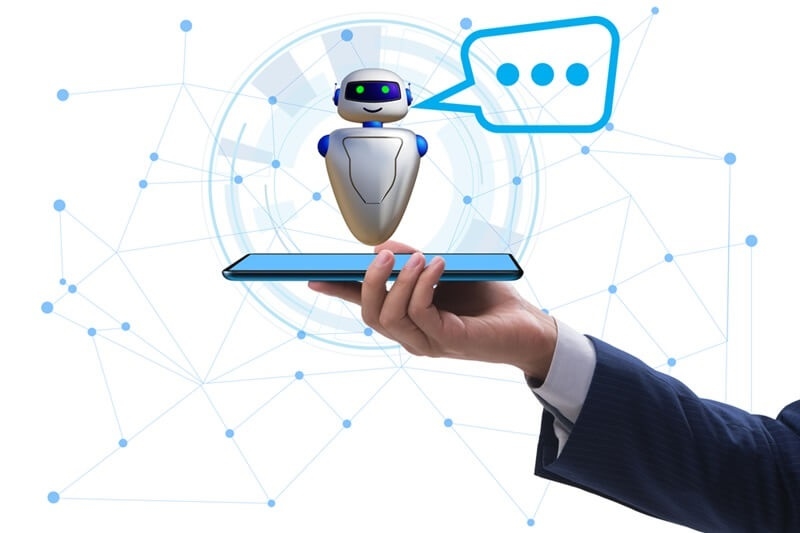
In this digital-first era, the advent of AI virtual assistants and chatbots is changing the face of online service delivery, and it's not just a passing trend; it is an advance in how companies are going to provide customer service, 24/7. Companies across industries are embracing their AI chatbot software for websites to be more efficient, cost-effective, and ensure service continuity. The need for instant communication means connecting with a human being is not the only way to provide only service. The solution is an intelligent automation way of operationalizing real-time processing and data analytics through assisted intelligence with AI support.
Companies are investing in chatbot AI customer service software, and any business, from small e-commerce to enterprise-level organizations. The case is compelling: less wait times, improved scalability, and 24/7 service, communication, and care. It's not just about simply saving money, but rather how to create an experience for your customer in delivering service and support, with the use of technology and the human factor as well!.
Chatbots that support AI are becoming the backbone of the customer service structure. Bots are designed to respond to repetitive questions, guide users through a website, and solve routine problems - without human intervention. More than 85% of customer interaction is predicted to begin with automated conversation platforms until 2025.
Through the employment of AI chatbot software for websites, businesses optimize processes while making users feel heard. Such software integrates well with CRMs, helpdesk software, and messaging apps, providing seamless assistance that resembles human feedback.

When comparing the performance of human vs AI support metrics, the statistics tell a powerful story. AI-infused systems are faster, more reliable, and more accessible than human beings. A comparison is presented below:
But there are nuances. While AI customer service via chatbots affords remarkable operational efficiency, humans are tasked with problem-solving and emotional intelligence. Thus, today, many organizations utilize a hybrid model—AI manages the initial layer, and companies employ human beings to address complexity when it increases.
Repeating the keyword: The combination of automation and human understanding that demonstrates how chatbots and AI assistants are changing per online customer care today.
Not all chatbot platforms are created equally. Choosing the right AI chatbot tools for websites is based on the company size, the user's needs, and the level of integration required. Some of the best AI bot platforms utilize cutting-edge NLP (Natural Language Processing), multilingual capability, and sentiment analysis.
Leading AI bot applications or platforms like Drift, Intercom, or Zendesk Answer Bot are setting the standard for ease of use automation. They also support CSAT (Customer Satisfaction Scores) and provide actionable insights that can be leveraged to grow your business.
For companies, one of the most common questions is what is the chatbot integration cost in the US - and it could be vastly different based on the chatbot solution.
For small startups, open-source or plug-and-play AI chatbot software for websites might be more cost-effective. But for mid-sized and large companies, spending money on a scalable, secure platform with advanced analytics is usually money well spent.
However, don't focus solely on up-front costs. The ROI makes sense when considering lower customer service overhead, increased retention, and quicker problem resolution.
Information security is crucial when an organization deploys a chatbot. The attendant issues of privacy associated with chatbots go beyond mere legal compliance; they feed directly into both customer trust and organizational reputation.
One of the goals of deploying a chatbot is to establish an ongoing relationship with the user (a customer), but the bot exists in privacy land, meaning the end-user will want to know that their personal information will remain confidential. Some important privacy-related issues to consider are:
The top AI bot platforms are integrated with privacy frameworks and provide user options for opt-out or user data deletion.
Contemporary AI is not about responding to queries—it's about predicting needs. AI assistants study previous conversations, customer habits, and preferences to offer customized support in real-time. Here's how this customization appears:
This not only enhances interaction but also reduces the sales process. For online shopping, applying chatbot AI customer care with personalization incites better conversion rates and average order values.
Some myths surrounding AI-powered support continue to persist, no matter how successful they are. Here are a few we've busted:
Myth 1: "AI Chatbots Take Jobs Away From Humans"
Fact: They free up human agents to work on the high-value tasks. They keep people engaged by removing non-meaningful work.
Myth 2: "Chatbots Always Infuriate Customers"
Fact: Poorly constructed bots do. But with the top-rated AI bot platforms, satisfaction rates match or beat human agents' scores.
Myth 3: "They're Too Expensive"
Truth: The cost of integrating a chatbot has come down greatly. Small businesses can afford SaaS plans that offer affordable, plug-and-play solutions.
Myth 4: "They Can't Understand Emotions"
Truth: Most AI today has a built-in ability to use sentiment analysis to recognize tone. If there is something abusive, the bots will escalate to a person.
They have a bot so people can place an order, make changes, and track orders on Facebook Messenger. They saw a 35% reduction in customer service calls.
They have a personal AI assistant to recommend products, make appointments, give tutorials, and much more. Bookings jumped 20%.
Its AI chatbot helps customers choose an outfit according to fashion tastes, increasing mobile conversions.
These instances highlight how chatbots and AI assistants are redefining online customer service with quantifiable success.
As AI technology advances, so do customer support approaches. Future innovation encompasses:
The future of chatbots AI customer support is leading towards more independence, more empathy, and even more personalization.
In short, the ways chatbots and AI assistants are transforming online customer support are clear across the board of digital service delivery. From enhanced human vs AI support ratios to privacy-conscious, customizable platforms, AI is no longer an optional future enhancement—it's a necessity in today's modern era.
Thanks to scalable solutions that have chatbot integration cost US in varying USD amounts, small businesses can also benefit from the efficiencies of AI and 24/7 responsiveness. Investments in AI chatbot tools for websites will keep businesses competitive, responsive and ready for the future.
This content was created by AI